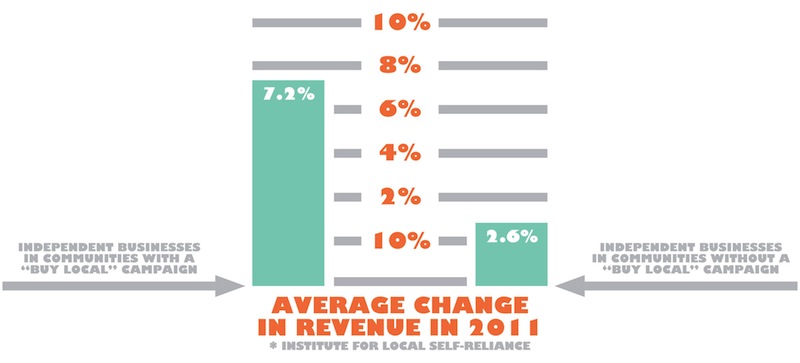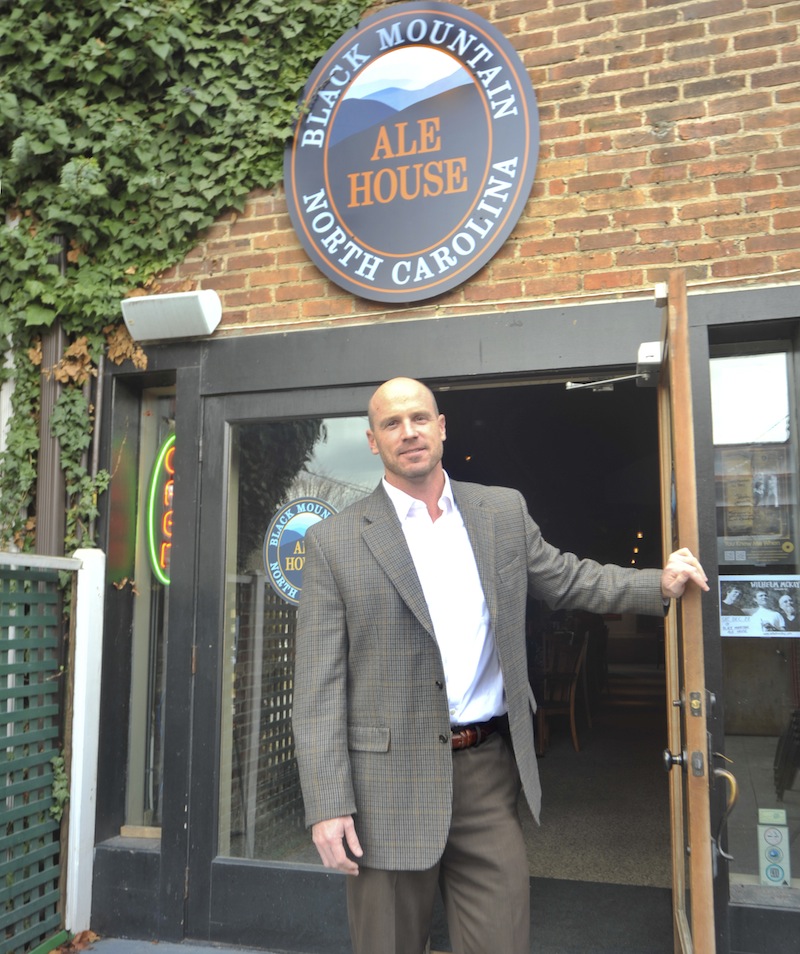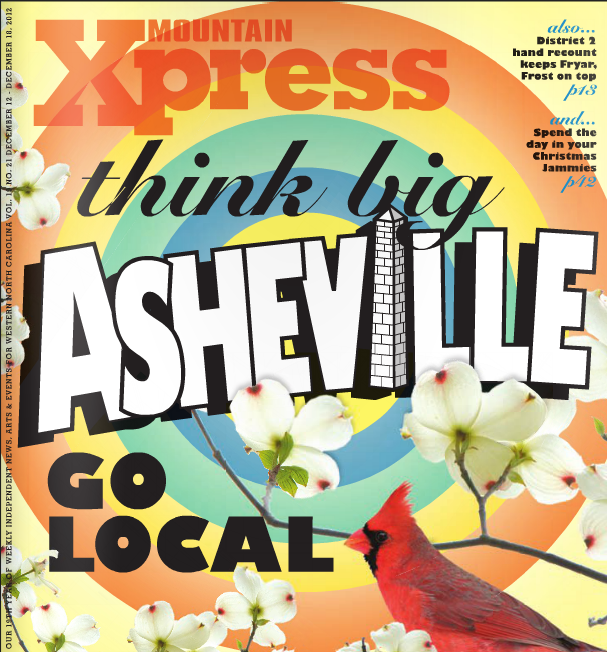
Attitude affects outcome: According to a survey by the Institute for Local Self-Reliance, independent businesses in areas with a “buy local” campaign reported nearly three times as much revenue gain last year. Image courtesy Institute for Local Self-Reliance.
Somebody suggested stickers; someone else proposed thank-you cards. But when the Lexington Avenue Merchants Association’s August 2009 meeting adjourned, the push to promote local downtown businesses was still little more than talk. That changed a few months later, when one of the group’s newest members had a full-grown aha moment.
Love Asheville Go Local
“I had this huge vision of everyone in downtown Asheville wearing the same T-shirt on the busiest days in December,” remembers Franzi Charen, who founded the Asheville Grown Business Alliance. “Instead of each of us wearing our uniforms or competitive logos, one day a week we could switch to something that showed we’re all working together on this something that unites us and creates the Asheville that we all find so special.”
That was three years ago, but Charen still remembers that first “go local” campaign clearly: the posters, the people and the purpose.
“Graphics Four printed 200 posters for free, and I ran all around downtown telling people to please put these in the window for the holidays that we’re going to encourage people to visit the places with the posters and support local independence,” she recalls, sitting on the brown couch in the center of Hip Replacements, the vintage-inspired boutique she and her boyfriend, Kip Veno, had bought the year before.
But what Charen calls her “silly little grass-roots campaign” really worked, and by February, business owners were asking her what would come next. After playing around with different designs, she responded — just in time for Valentine’s Day — with the movement’s most popular design to date: Love Asheville—Go Local. That’s when Asheville Grown, her labor of local love, started taking root.
“I began to get really excited about the possibility of creating this united community front that went deeper as an educational campaign that so many could get behind,” she reveals. The concept, Charen explains, was “branding local, independent businesses in Asheville and highlighting that they’re crucial for the local economy and for the city’s health and sustainability” (see sidebar, “Getting Started”).
A community interest
Asheville isn’t the only city making those connections, notes Jeff Milchen, co-founder and co-director of the American Independent Business Alliance. Since AMIBA began more than 10 years ago, the nonprofit has helped more than 80 such groups in the U.S. and Canada get their start, including Asheville Grown. But not all “go local” movements are created equal.
“The most successful alliances,” Milchen explains, “are those where everyone recognizes that having thriving downtowns, neighborhoods serving business districts, a strong base of independently owned businesses and ongoing opportunities for entrepreneurs is a community interest — not just a business interest.”
With that approach in mind, Charen organized a four-person steering committee (it has since grown to 10) that meets monthly to figure out how Asheville Grown can, well, grow.
“It wasn’t just about feel-good heart-branding: It truly had meaning behind it,” she stresses. “We wanted to do it right.”
Unlike similar alliances, Asheville Grown charges no membership fee and hasn’t sought nonprofit status. The volunteer-based model, Charen maintains, has paid off. “People do feel the ownership,” she says, pointing to one of the Love Asheville— Go Local signs in her shop. “These are not our materials — they’re tools that we’ve given the community to use.”
Charen hopes those tools will spread the message that there’s a close connection between being a conscious consumer and an informed citizen. “You’re voting with your dollars, and you’re choosing the type of community you want to live in,” she asserts. “What we’re talking about is not only creating more money circulating in our economy, which creates more opportunities for entrepreneurs. We’re talking about what creates more jobs — and we want to be clear on what kinds of jobs we want to be creating.”
Milchen echoes that sentiment. “When people are spending more money at local, independent businesses, much more of that wealth is staying within the community. It’s not just making individuals wealthier, it’s contributing to the local tax base in a big way. That means municipal and county governments have more money to spend on schools, on public safety and better roads and bike paths,” he continues, adding, “All of that makes a big impact on the quality of life.”
What can we build?
Leah Ferguson made that connection last year, when she was working as co-director of the Asheville City Schools Foundation. Seeking an alternative to generic corporate fundraisers, she approached Charen about sitting down and mapping out their dreams for their respective organizations.
“We came to the table with questions: What do you care about? What drives you?” Ferguson recalls. “What we found is that there’s an overlap, that we both really care about this idea of collaboration. It wasn’t about what we could get but what we could build.”
Thus was born the Go Local Card. Two-thirds of every $16 card purchase supports school projects and the nonprofit foundation. The rest goes to Asheville Grown. Cardholders, meanwhile, get a discount at participating businesses, whose numbers have since tripled to 360. In its first year, the rewards card raised $10,000 for the city schools and the foundation.
For Charen, it was the perfect opportunity to unite the community in a distinctly Asheville grass-roots campaign.
“Now we’ll be taking [the movement to] the citizen who purchases the card, the local independent businesses who give the citizens an incentive to have the card, and then the schools who help spread the word about the card,” she says. “We have just reached everybody in our community with this one little thing, and everything we’re doing is benefiting the other things. You can’t get much better than that.”
Regional is the new local
For Asheville Grown, the next step is reaching out to other “go local” groups in Western North Carolina and beyond.
On Nov. 9, Charen traveled to Pittsboro, N.C., to speak at the North Carolina Local Economy Summit. But she wasn’t there just to talk: She was there to network.
“Local is so much more than just what Asheville can do. Local is, at the very least, within 100 miles, but local is a very regional concept. There’s no way we can do everything in Asheville,” she points out. “It’s about taking local to the next level, raising the bar about what local means.”
Indeed, notes Milchen, local has recently expanded to include whole states and even regions. Four years ago, for example, the New England Local Business Forum was launched, uniting 20 local-business networks in Connecticut, Maine, Massachusetts, New Hampshire, Rhode Island and Vermont.
One key reason is increased bargaining power with lawmakers. “There are a lot of important decisions made at the capital that pretty directly influence independent business, even more so than some decisions made at the local level,” he explains.
North Carolina, says Milchen, may not be far behind.“There’s really a lot happening right now,” he reports. “These local groups are starting to build toward that next step of building statewide communication and, ultimately, doing some statewide organizing work.”
Nonetheless, says Charen, there’s still important work to be done here at home.
“The way you can give back to our work is by taking on the work yourself and spreading it far and wide, wherever you are. Whether it’s on your street talking to your neighbors or promoting local independent businesses, the broader it gets, the better it is for everyone.”
 (PHOTO: Indie pride: Black Mountain Ale House owner John Richardson sees opportunity in the “buy local” movement. In November, he founded BAR, an independent business alliance similar to Asheville Grown. Photo by Bill Rhodes)
(PHOTO: Indie pride: Black Mountain Ale House owner John Richardson sees opportunity in the “buy local” movement. In November, he founded BAR, an independent business alliance similar to Asheville Grown. Photo by Bill Rhodes)
That’s exactly what Black Mountain Ale House owner John Richardson aims to do in his community. Last month, he co-founded Black Mountain Arts and Restaurants, aka BAR.
“Black Mountain,” he says, “has never branded itself in terms of marketing ourselves and sharing with the world who we are and what makes us Black Mountain. We have 34 independent restaurants and 16 art galleries, but you’d never know that.”
For now, the new alliance is focused on recruiting members and educating the public about what doing business locally really means. But that’s only the beginning, says Richardson, who’s already thinking about creating signs, an after-hours event à la Downtown After 5, and a race that will end at the planned town square.
Charen, meanwhile, is looking toward the future of Asheville Grown with this simple message: Keep growing.
“Just being local and independent isn’t the end,” she believes. “It’s a constant growth, and the more that we grow in that way, the more we can create opportunity for everyone.”
Caitlin Byrd can be reached at 251-1333, ext. 140, or at cbyrd@mountainx.com.




Before you comment
The comments section is here to provide a platform for civil dialogue on the issues we face together as a local community. Xpress is committed to offering this platform for all voices, but when the tone of the discussion gets nasty or strays off topic, we believe many people choose not to participate. Xpress editors are determined to moderate comments to ensure a constructive interchange is maintained. All comments judged not to be in keeping with the spirit of civil discourse will be removed and repeat violators will be banned. See here for our terms of service. Thank you for being part of this effort to promote respectful discussion.